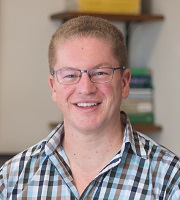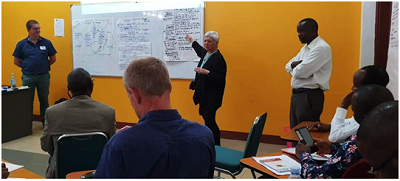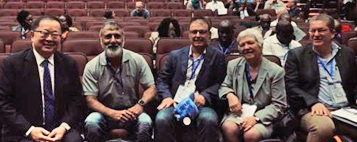Klaus von Pressentin, Montegut Scholar, on WONCA Africa conference

Klaus B von Pressentin reports on his attendance as the Montegut Scholar, at the WONCA Africa 2019 conference, in Kampala, Uganda, from June 4-8, 2019. Klaus is from Mossel Bay sub-district, South Africa. The
Montegut Global Scholars Program is funded by the American Board of Family Medicine Foundation (ABFM-F).
Read more about Klaus here.
1. Acknowledgements
I would like to thank the American Board of Family Medicine Foundation sincerely, for making this conference attendance possible through the Montegut Global Scholars Program.
2. Primafamed pre-conference meeting activities (4 - 5 June 2019)
This two-day pre-conference meeting of the Primafamed network saw 46 family physicians from around twenty countries coming together to discuss education and research in family medicine within the African region. On day 1, I helped Professor Bob Mash (Head of the Department of Family and Emergency Medicine at Stellenbosch University, South Africa) and other members of the PHCFM (African Journal of PHC and Family Medicine) editorial board to facilitate an interactive workshop on peer review.
 Photo: workshop on postgraduate training during the Primafamed meeting
Photo: workshop on postgraduate training during the Primafamed meeting.
During day 2, colleagues from the Besrour centre - Canadian College of Family Physicians (a new partner of the Primafamed network) facilitated a discussion around how family medicine is situated in relation to the Astana declaration from a global and regional perspective, with a focus on three Astana domains (mental health, team-based care and advocacy/social accountability). This was followed by a workshop co-facilitated by Dr Innocent Besigye and myself, during which we explored the state of family medicine training in the network countries.
During the afternoon session, Professor Mash facilitated a workshop during which the network members clarified the form and function of the Primafamed network whose administrative hub will now be hosted at Stellenbosch University.
3. WONCA Africa conference activities (6 – 8 June 2019)
The main conference consisted of a rich mix of keynotes and parallel sessions (workshops and oral presentations), and was attended by 181 delegates from 32 countries. The keynotes featured the topics of training the primary care workforce (Professor Mash) and some country examples of family medicine training and practice (University of Makerere and University of Gezira) on day 1.
The keynotes on day 2 included the chair of the WONCA Rural Practice Working Party, Dr John Wynn-Jones; Dr Donald Li (the current WONCA World president) who gave an overview of the development of family medicine in China from a training and policy perspective; Prof Amanda Howe (past president of WONCA), during which she discussed the roles of champions in developing family medicine in LMICs.

Photo: Dr Donald Li, Prof Shabir Moosa, Ass Prof David Poňka, Prof Amanda Howe and myself.
Another keynote worth mentioning is that of the WHO Africa representative, Dr Tumusiime Prosper, who cited the 2019 MOU between WONCA and WHO as a key achievement, and highlighted the central role of family physicians in strengthening PHC towards realising UHC (universal health coverage) in Africa. He left us with no uncertainty regarding the need for family physician-containing teams to achieve high-quality PHC. He also raised a few very key questions:
• How best can we use the limited number of family doctors?
• Can we explore options of extending practices of family medicine to mid-level and frontline workers? How do we overcome professional barriers?
• How do we ensure we get engagement of multidisciplinary primary healthcare teams?
• How do we best integrate the family doctors into existing district health systems?
The presence of the WHO African regional office during the conference (keynotes, parallel sessions and presidential dinner) emphasised a solid commitment to building family medicine as a discipline in Africa.
I was involved as lead facilitator or co-facilitator in four workshops during the parallel sessions, namely: Measuring primary care performance; Exploring the family physician’s clinical governance role through the lens of antimicrobial stewardship; Work-based assessment in family medicine and, the use of mobile phones in Sub-Saharan African countries and Canada for healthcare – what can we learn from each other.
The conference concluded with the
Kampala commitment to universal health coverage, primary health care and building the capacity of primary health care teams at scale in Africa. This commitment links well with the MOU signed between WONCA and the WHO at the start of 2019, as well as the 2018 Astana Declaration.
4. Building networks: research contacts and collaborative projects
The Primafamed pre-conference meeting was a very valuable experience. The formal recognition of the Primafamed network as the academic wing of WONCA Africa is another important step forward. This represents opportunities for collaboration and support through network partnerships (such as research and building capacity at doctoral level).
The workshops during the pre-conference and main conference may continue as collaborative projects, especially regarding the PCAT (an existing collaboration with new interest: which metrics will be most suitable to assess quality within the “blackbox” of the patient-provider interface, the consultation), work-based assessment (other training institutions are interested in the electronic portfolio of learning) and the use of mobile phones in healthcare (possible article or conference report). The conference provided a sound platform of building new and existing networks, especially with colleagues from the African region and Canada (Besrour centre and McMaster University).
5. Action items
Our setting (the African region) still has to attain a critical mass of family physicians. We need to remain grounded in the daily clinical interaction with our patients and healthcare teams, which often remains a source of inspiration and authenticity for our “other activities” (such as educational and research activities). We need to remain connected to the clinical environment when taking on additional roles, such as that of “clinician scientist” and/or “clinician educator”. This sense of being grounded in clinical practice, will make us better clinical teachers and applied researchers.
The WHO Africa regional representative, Dr Tumusiime Prosper, challenged us with a number of key questions, as mentioned above. Some of the answers may lie in our desire to become “family medicine champions”, as described by Professor Howe in her keynote: those who are able to help develop our discipline by being living examples in practice, contributing to the research base by documenting our progress and striving towards enhancing the quality of our care, engaging with managers and policy makers through advocacy and leadership, and being role models to our junior colleagues and students (the next generation of health workers). By sharing the principles of family medicine and high quality primary care within our multidisciplinary teams (in a manner which transcends professional boundaries), we will make progress towards integrating family doctors into existing district health systems.
6. Social media
A selection of photos was shared on
Facebook and Twitter (#Primafamed19 and #WoncaAfrica #Kampala2019).